#aph meta
Explore tagged Tumblr posts
Text
Re: Sweden, Norway, and Denmark's Japanese dialects in Hetalia (and potential implications to their characterization) (with briefer notes about Fin and Ice)
Thanks to @nordickies for being the spark that lit the fire to write this post. This information also personally has informed some of my personal takes on the Nordic 5 for over a decade now, so I hope it is useful. A lot of this was more common knowledge back in the livejournal days of the fandom.
Disclaimer: my Japanese is limited and by no means do I claim to fully understand all of the cultural complexities surrounding this topic. I will try, where I can, to back up my claims with at least somewhat credible sources especially since I am someone who is not Japanese in origin either ethnically or culturally, however I DO know more than the average person would because I have lived in Japan, was exposed from my practical birth to the culture and language waaay more than is typical due to me living overseas, and I have studied the language on an elementary level in several academic settings. I am by no means an expert (I am a wildlife biologist by trade), but all of this is done in good faith, and if you do know more than me (especially since I am limited in my ability to get access to academic texts right now — nor am I going far out of my way to find those, as this is a meta post about Hetalia of all things and I am not going to do a whole giant thesis about this for one post), feel free to correct me and/or send me further resources, as I want to convey as accurate of information I can as possible. Part of my motivation for making this post was to spur conversation and hopefully have others who know more than me contribute to the ongoing conversation, to which, I encourage those who read this post to check the notes for any further updates. Another note that I also do not originate from a Nordic country, so there may also be additional layers people from those countries may be able to add. Thanks! Let's begin.
*********************************************************** Like several characters in Hetalia, the Viking Trio speak in unique Japanese dialects that further make them distinct and characterize them in Japanese. Sweden speaks in a Touhoku dialect, Norway in the Tsugaru dialect (which is a specific type of Touhoku dialect), and Denmark speaks in Ibaraki dialect. The Ibaraki dialect is sometimes seen as belonging to the Touhoku dialect group or the Kantou dialect group, and the classification is debated. Generally, Touhoku accents are characterized by slow speech, the slurring of words together, and the muttering of words — as well as being associated with rural country folk (Kumagi 2011, direct PDF download). This dialect is often translated into English as a redneck/hick accent and drawling speech — and as those who speak it are often characterized or stereotyped as unintelligent folks from out in the sticks. Kumagi cites Inoue (1977) as saying that Touhoku dialects are "degraded at the bottom in the Japanese language" scoring low on "intelligence and emotion-related associations." One American English rough equivalent (not localized, but in terms of reputation in U.S. culture) by my best estimations would likely be Appalachian dialects, which are also stereotypically characterized as being a hillbilly, unintelligent, and rural accent also featuring drawled speech and often truncated speech (source). Like many Touhoku dialect speakers in Japan, Appalachian dialect speakers often hide, mask, or reduce their accent, especially if they relocate someplace outside Appalachia, in order to seem more credible to others, as it is generally seen as an “inferior” dialect of American English in the wider culture (personal/family lived experience, but also a good radio piece on it here). The other way Touhoku dialects are translated in media are as Upper Midwest or Northern Plains dialects of American English (not the most credible source, but a lot that is on here that I can confirm to be correct). This characterization is likely a more accurate candidate for the Nordics (and may be why Hima chose this dialect group for them), as many immigrants from Nordic countries settled in the Upper Midwest/Northern Plains (source, personal experience living in this region for a lot of my life). Touhoku dialects are also a more northern dialect group, which geographically coincides with the Nordics being, well, northerners!
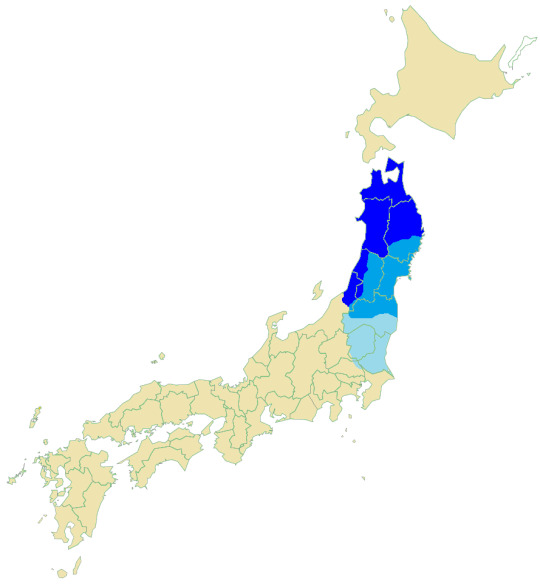
(Map of Touhoku dialects regionally) I have not been able to find any information re: if Sweden speaks any particular type of Touhoku dialect (or if it is more broad), but I will talk a bit about how his speech was transliterated in early scanlations before moving on to the other two. Because of how slurred/more truncated/less intelligible Touhoku accents generally are (and remember, Den/Nor/Ice did not make their appearance until well after Swe/Fin did!), likely early translators decided to chop off letters/make Sweden's speech seem less intelligible in order to convey that to readers. Unlike Norway and Denmark, Sweden also often speaks in shorter sentences/phrases in Japanese, and given that Finland canonically says "it's just hard to communicate with him" (see Running Away with Mr. Sve) that is also likely why early Hetalia scanlators before official translations of the comics were available (note: god this is making me feel old as hell) made the decision to give him the speech patterns that they did, and that ended up spreading through the fandom. When the other Nordics with their regional dialects dropped, given how Sweden’s vocal trait got translated into English and then fandom ran with it to varying degrees of intelligibility, I think the decision was made to not translate Norway the same way to cause less trouble in fanworks, while the Ibaraki dialect did influence how Denmark was translated (more on that below.

Norway speaks in a very particular Touhoku-family dialect within the series that is generally not well-reflected outside of the source material at all. The Tsugaru dialect is spoken in the northwest part of the country, specifically in the western part of Aomori Prefecture — Tsugaru dialect is a particularly unusual dialect, even by Japanese dialect standards, by being one of the most difficult dialects in Japan to understand (source). Even within Japan itself, people speaking this dialect often have to be subtitled on television for other Japanese audiences to understand, and there have been occasions where the dialect has been displayed on television to marvel at how strange and unintelligible it sounds to other Japanese speakers. Sometimes speakers of this dialect have been characterized (or mischaracterized for comedic effect) as French in Japanese because the odd sound and unintelligability of the dialect (source). Kumagi (2011) also states that "[...] within the Tohoku [alternate transliteration of Touhoku] dialects, Aomori [prefecture in which Tsugaru is spoken] dialect is at the bottom [of the hierarchy]," meaning that even among the already disrespected Touhoku dialects, Tsugaru belongs to the worst of the bunch in terms of reputability and respectability in Japanese perceptions. The Tsugaru dialect is a source of fascination, comedy, and disrepute/low standing all at the same time. While we don’t know why Hima selected Norway to have this dialect, I have a few proposals. First, this gives him a similar flavor to the other members of the Viking Trio while keeping him distinct — while Ibaraki is a more southern dialect geographically (for the region), Tsugaru is spoken both more north and more west than it. So if you map their dialects out on a map, their geographical location to each other also somewhat resembles their actual locations as nations to each other in the Nordics! Which is neat!
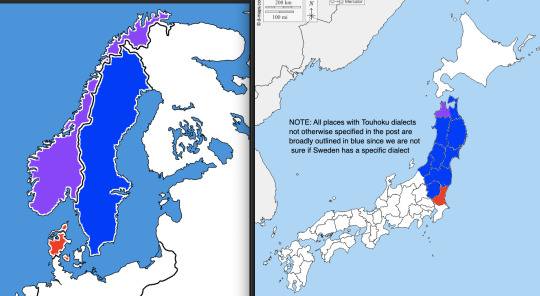
Second, Hima characterizes Norway has being slightly otherworldly and unusual largely due to his fairy-friends and such. But I also think that he likely chose Tsugaru for him not only because that makes him seem like he’s out of this world, but also because Japan is kind of fascinated by that dialect in particular despite not holding it in high regards by it too — sure, it is a hick accent, but it is an interesting hick accent. I think the fact that Japanese speakers sometimes liken the dialect to French is interesting specifically because of how Japanese people often view the French — French culture something that is often romanticized and idealized, and given how Tsugaru dialect can sound French-ish to Japanese speakers, that may be why Norway is kind of designed as the “pretty boy” of the trio by the fandom? In the same way that “Paris Syndrome” is a thing, where Japanese who go to France are often shocked at how their idealized version of France does not live up to the realities of the country (trust me it's real there is a wikipedia page lol), I think you can argue that in-universe Norway can be seen in a lot of different ways depending on the preconceived notions of how you view the dialect. If you view it as French-like and think it sounds interesting, you may find it alluring/beautiful. If you think it is crass, you'll look at it with disdain and disgust. If you think it just sounds silly and stupid, it is. If you think it is nostalgic (as Kumagi states that this is the only positive association this dialect has) and has a close association with nature/pastoral life because of that, it is. I think Norway in canon is characterized on all four of those axioms at the same time (if you really wanna pull canon receipts I will at another time) which makes this make a lot of sense to me as to why that dialect was chosen for him. Third, I think that given Norway was largely the worst off of the three kingdoms for most of history, it makes sense to give him the worst accent in terms of reputation/status out of all of them, too. Note: specifically, re: how Norway uses "brother" in Japanese is also interesting when referring to Denmark. What he is saying is "anko" (あんこ), which literally means "young man/eldest son" directly translated and is specifically only used to mean that in northern Japanese dialects. A good way to put it is it is like people in the U.S. use "bro" as a catch-all term for a similar-aged guy you are trying to get the attention of kind of informally, in the same way you can say "nii-san" to both mean "older brother" and also "guy who seems older than me I am addressing informally" I guess?? Funnily enough, which I didn't know until researching shit, it apparently also means bottom (homosexual) in prison slang??? Which may or may not be intentional I guess on Hima's part, and could also influence your characterization of Norway as a result. Finally we move on to Denmark. The Ibaraki dialect is characterized by number of things, but for our purposes I think that the two most important traits are the general lack of polite speech and the slightly faster rate of speech (unfortunately, my only written sources I can point to are wikipedia and TV tropes again, but I have heard this orally from someone a long time ago - I looked for more credible sources but couldn't find any easily). Because of it being debated as to whether or not is a true Touhoku dialect or if it is actually a Kantou (more southern/eastern) dialect, I think you can also argue that makes sense given Denmark is kind of the "gateway" into the heart of Europe geographically. People have generally translated this as him being excitable and more casual in the way he communicates to other people. I have been able to find less resources on this particular dialect and how it is perceived culturally, so I will sadly have to leave it at that, but from my understanding he is generally translated appropriately in the manga from what I have seen, with the -in' instead of -ing and ya instead of you to have it seem more relaxed/familiar/casual.
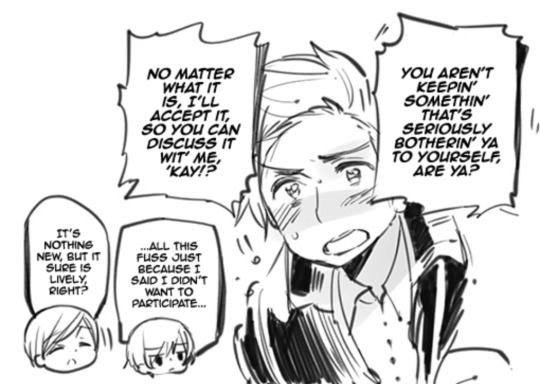
Final notes on Finland and Iceland: I cannot confirm this personally, but from what I can hear from Finland, it sounds like he speaks pretty standard Japanese to me, but take that with a grain of salt since I am not the expert here. Which, dialect-wise, places him as the odd person out (which fits with Finnish being the linguistic outgroup of the five) and also puts him as the relatable “stand in” for Japanese people learning about the Nordics — reminder he is the one who introduces them all in that one comic (see The Nordic 5+a) and even earlier comics (see Running Away with Mr. Sve), and we’re viewing the Nordics from largely his perspective). Since Finland in this series is largely characterized (and often deemed a poor stereotype by Finns) because of the Japanese perspective on Finland/Finns, it makes a lot of sense Hima used him kind of as a self-insert for Japanese readers/viewers to understand the Nordics from, as of the Nordic nations, Japanese folks are likely going to have the strongest familiarity/connection to Finland because of the Moomins. Please take the following information about Iceland with heaping grains of salt, but from a memory, I believe he also speaks the Tsugaru dialect, at least some of the time???? This makes sense he shares the Tsugaru dialect with Norway, as he’s Norway’s in-canon sibling, but I have a vague memory of a meta post I cannot 100% confirm or deny exists re: him only speaking the dialect/the dialect coming out more when he’s alone?? This following is speculation since I cannot confirm/deny that right now with my current abilities, but if it is true, would also be an interesting level to his character and make sense — it puts further distance between him and Norway if he purpsefully doesn’t speak the same way as his brother when his brother is present, and it also is reminiscent of my own experience living with people with discriminated accents who then mask their “less desirable” dialects in their teens/20s so they don’t get discriminated against as they move up in the world. Kumagi (2011) states that "Therefore, young female native speakers of Tohoku [alternate transliteration] dialects feel ashamed of their dialects and hesitate to speak them in big cities such as Tokyo. They are made to feel inferiority complex about their dialects, which are stigmatized as unfeminine". Since Iceland is very much characterized as a teen in canon, I think that this makes sense to do in the broader context of Hima’s choices. The specific reason as to why I state that I believe he speaks Tsugaru some of the time but not always is because there are some panels he speaks without it and some where he does seem to have an accent (HWS Chapter 112, relevant screencap below, this is the only time he speaks like this from what I can find in scanlations/translations, but it has to be a deliberate choice). Would love more info on this from someone who knows more about Japanese than I can do.
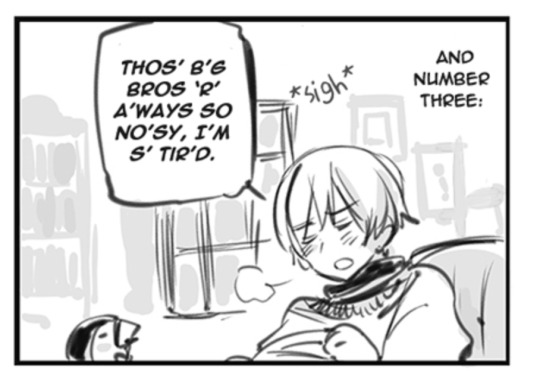
Again, please check the original post and/or notes for any future additions that I will add/edit accordingly (with notes as to where/when that happened) if any other relevant information surfaces, but I hope that was at least a little informative and interesting to read. I consulted a bunch of other resources too (read a bunch of papers I could find online), but a lot of those I read several months ago and no longer can find :x otherwise I would list them here.
Let me know if there are any typos/things are unclear, b/c holy shit this took a lot more effort and time for me to write up than I thought it was going to, and I am too tired to proofread it after spending several days on it. X_X
#hws norway#hws denmark#hws sweden#hws nordics#aph nordics#hws iceland#hws finland#pyrrhocorax meta#just so it is easier to find again :/a#anyway i hope this is interesting at least. idk how this fandom tags stuff anymore
115 notes
·
View notes
Note
i really wanna hear more about the 2ps possessing their 1ps?? do they swap bodies or does their original body just go limp?

a) it's not quite a "body swap." the phrase i've used in past writings for it is "overwriting." i think "suppression" would also be appropriate. the 1ps are, if all goes to plan, "put to sleep". they essentially become a repressed memory. oliver set it up like this because he didn't want the 1p nations trying to constantly win back their body. even so, some nations put up a real fight as they're overwritten (and maybe even a little after if they're strong/stubborn enough... ahem ahem america) italy is not one of them though, partially because 2p italy got him in his sleep.

b) yeah they just go limp lol . they're empty husks, now. free meat. england would try a bite if it canada would let him
#hetalia#hws#2p hetalia#aph#2p england#2p canada#2p italy#1p mention#aph italy#aph england#thank you so much for your ask... i was so happy to hear you were interested in my silly 2p lore ... ive been developing it since 2017 lol#idk if i ever mentioned it before but olivers assistant that i tried to keep a secret.. its just canada haha.#im skippin around the timeline but as of the current (non-meta) ask only eng and canada know about the 1ps.#ask#zombie91514#ic#blood#there's a secret in the top pic. can you find it? hehehehe#more arbitrary kanji usage because im a stupid idiot dork and wuv wuv using it#heard that usage of 別人 as opposed to 他人 implies something truly foreign and different... almost like an alien.. almost like... another worl#wish i knew if “another color” in jp is 別の色 or 他の色 tho#edit: im gonna cry its just called 2Pカラー afa i can tell NDSJFKHDJSHFK#実は「にぴからー」と言われる?#eh anyway
57 notes
·
View notes
Text
My favorite thing about hetalia astrology is how you can kind of combine it with hetalia anatomy. I'm going to use America as an example. When Pluto entered Capricorn, causing America to experience its Pluto Return in 2008, the main place within his birth chart that got affected was his Second House, the place where his natal Pluto in Capricorn is stationed (aka the place where Pluto in Capricorn was in the sky when he declared Independence).
Now, planets, houses, and signs all govern over their respective body parts in astrology. Pluto governs over the reproductive system, the immune system, the bladder, colon, and bowels ( places that deal with elimination and purification, which is strongly tied to the themes of Pluto). Capricorn governs over the knees, the joints, the bones, and the skin. The 2nd house governs over the throat and the neck. So I imagine that when America experienced his Pluto return, he began dealing with thyroid disorders (2nd house affect), arthritis (Capricorn affect), and hormonal imbalances (Pluto affect) among other issues -perhaps common cold- which lasted for about 16 years and is soon going to come to an end. It's a fun thought to consider that the anatomy of nations isn't necessarily tied to the people or the land but the cosmos itself, which is tied to everything and everyone. Pluto entering Capricorn caused America's Pluto Return, which caused the Great Recession of 2008 that recked the global economy ( i guess you can take this as America accidentally spreading his cold, poor baby 😭😭😭). Pluto in Capricorn returned to the *exact* degree it was in during the declaration of Independence in 2022 (which irl dealt with issues with regards to reproductive health), and now it's slowly starting to recede.
France is getting ready to experience his own Pluto Return, and I imagine that illness is gaining speed and steadily descending on him like a Jaws theme 😭😭😭 it's like when your throat suddenly feels scratchy but you don't have the runny nose to go with it yet. For him, Pluto is in Aquarius in the 4th house, and Pluto is getting ready to enter Aquarius this November (the place it was over 200 years ago when the First French Republic was established during the throes of the French Revolution). So he'll be dealing with immune and reproductive system illnesses, like America, as well as issues with his calves, shins, and ankles (Aquarius) and his chest, lungs, and stomach (4th house).
Keep in mind, though, that these planetary returns aren't constantly hitting them. Pluto takes about 248 years to return to the original place it was in their birth charts, Uranus takes 84 years, and Saturn takes 29. So these are like once in a lifetime illnesses or conflicts that take them by suprise, lingering for a bit before disappearing for another couple of centuries or decades. They learn how to heal themselves better, whether that be literally or metaphorically (or like in a metaphysical sense), and they learn life lessons that braids itself into the fabric of their societies, cultures, history etc. So it sucks for a bit, but it makes them stronger after all is said and done.
52 notes
·
View notes
Text

you are nothing without my support | commission for @codesm
#alpha romeo tango#gerame // mach speed meta#hetalia#aph america#aph germany#hws america#hws germany#alfred f jones#ludwig beilschmidt#gerame#ameger
469 notes
·
View notes
Text

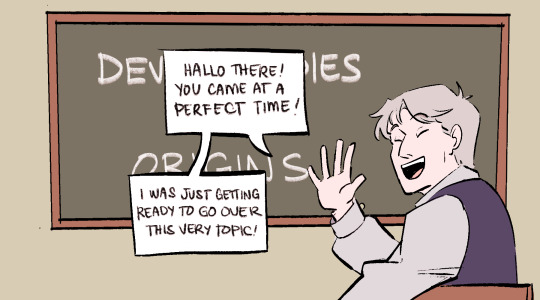

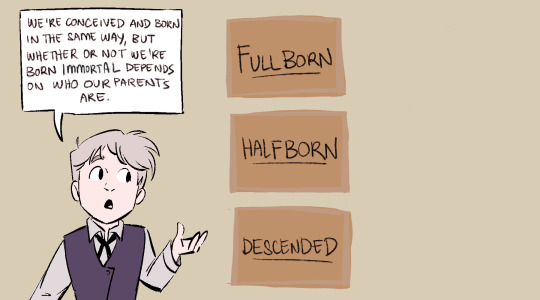
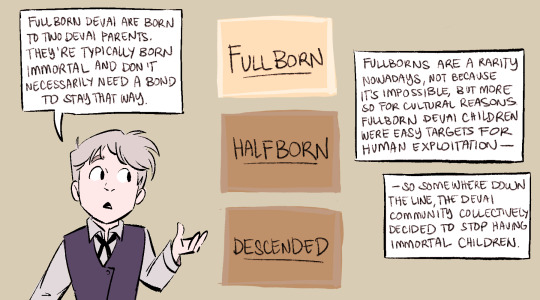
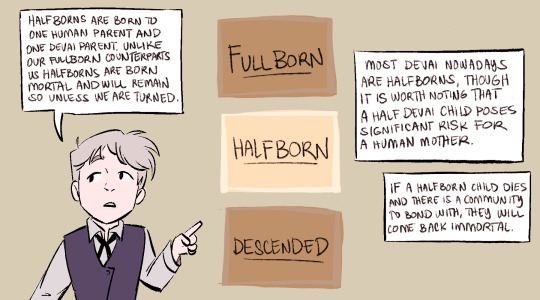

"To summarize, Devai can either be born immortal or they can be turned. Those who are turned require the help of a Mentor to help them adjust to their new life otherwise they become what my people call an Orphan. Speaking from experience, it's something you'd be wise to avoid.
There is... One other way to create a devas, but such a practice is considered taboo among our kind. It's probably best we leave that topic be for now,"
#answered#ask19thcenturydoctorgilbert#[ meta ]#hws prussia#aph prussia#gilbert beilschmidt#hetalia#there is a slight retcon to how fullborn devai exist compared to an earlier post i made#because im gnawing on the idea of immortal devai just existing but free from being bound to humans
68 notes
·
View notes
Text


OCtober Day 3: Corinth Physical Notes
I'd have to go back and look for more about Corinth's design in terms of how I arrived at it... I've always kind of pictured her as someone who has the appearance of a mature lady, and someone who looks deceptively soft. She's got a very defensive, rocky personality in spite of it all!
I haven't been colouring these, but her natural hair colour is probably a light brown (similar to Megara's hair colour). She experiments with various dyes to bleach her hair in the sun, I've heard lemon juice, vinegar, or even pigeon droppings were used in greco-roman times, but I'd have to do some more serious research.
#oc tober#aasa corinth#aph oc#hetalia oc#hws oc#hapo art#digital art#clip studio paint#hapo doodles#aasa meta#ancientalia
21 notes
·
View notes
Text
I feel something of a pity when I see how the fandom ignores Egypt's potential.
Just think: dude was the strongest muslim state for a century. Was a shia caliphate. He fought with the Byzantine E. and western european crusaders for the Holy Land - and won. Was a sunni caliphate and the Guardian of Mecca/Medina, third if you count the center in Syria and the center in Mesopotamia/Iraq. Even after the Ottoman conquest, he was always a “special” province, with his own wars, his own government. Almost conquered the Ottoman Empire itself in the 19th century. The Levant, Libya and Sudan have been his bitches for centuries. After all, only Britain, the strongest empire in history, could conquer him, and he was still on his own. During the Cold War, he headed his own bloc of Arab states against the same bloc of Saudi Arabia. And even despite the failure of socialism, Egypt is the most important state in the Arab world, literally the head of the family.
And the fandom sees this guy as a dreamy pyramid fan? They portray him as small, feminine, raised in Turkey lol what???
Dude was literally a beast of sword fighting, one of the centers of islamic mysticism, as well as orthodoxy and major political players. Yes, he himself taught a lot of people and things.
63 notes
·
View notes
Text
a series of (un)related posts
2008:

2009 (??????):
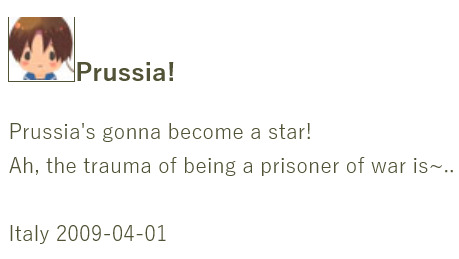

2011:
Not really a good thing for Prussia to be involved with Russia



(left out the part where he goes back to "bragging mode" bc "his little bro is strong so [Russia] doesn’t freak [Prussia] out so much anymore"). he changes his moods so fast i love him.
2013:
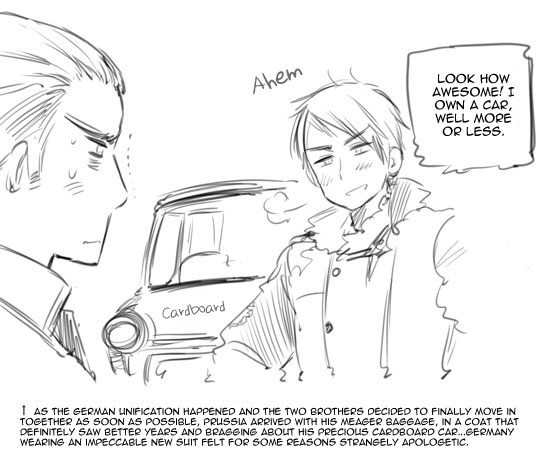
[T/N: that would be the infamous Trabant, I think.]
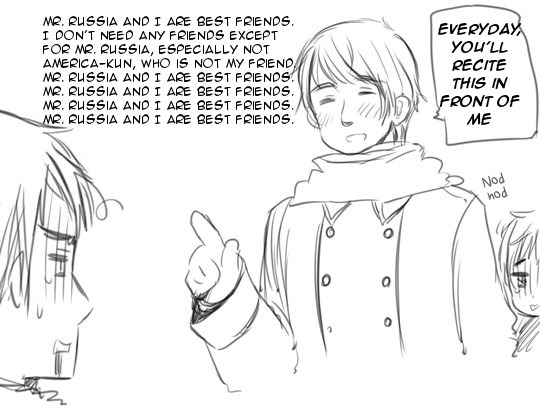
"The friends are increasing, it’s a good thing!"
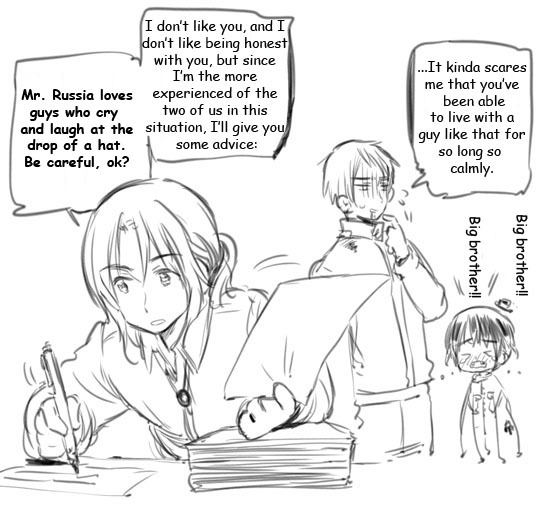
"I want to escape this cold place!"
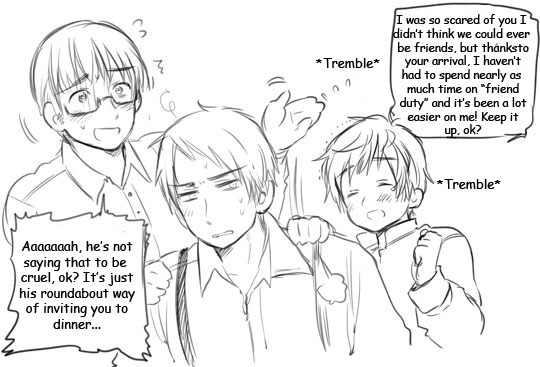
Acting like his seniors.

2015:

#the pain was to transcript everything#prussia=gdr#<-more posts about this in that tag. just scroll for older (better) posts#hws prussia#aph prussia#gilbert beilschmidt#hetalia#hws#hetalia meta#hws russia#hws lithuania#sr. tnddr#bamboo thicket blog
270 notes
·
View notes
Text
idea–the nations have some animalistic(not sure if I'm using the word right) features, based on their national animals/animals they are associated with. Or perhaps even being able to shapeshift into these animals.
Romania having fangs, but not because he's a vampire, rather because, they're the fangs of a lynx, and being capable of purring. Also Serbia having the fangs of a wolf. Some nations having eyesight and/or hearing better than humans. Bulgaria's national animal is the lion, so how about Bul having freakishly good eyesight in the dark(probably ro and serb too, and a lot of other nations tbh)? Perhaps his eyes even glowing a little in the night. Maybe England as well, since his national animal is the lion too.
The italies also having wolfish characteristics(Ancient Rome too). America being as strong and fast as the american bison. Russia is also as strong as a bear, probably has some of it's features too.
And sometimes it's a good useful thing, or simply fun when they have the free time to goof off and shapeshift as some animal. But other times...it's simply one more thing reminding them of the fact they aren't human. And humans, don't quite notice it at first, but eventually they do, and it's hard if they want to pretend to be human. Fitting in is terribly hard. For some humans, it's really unnerving and frightening, which sometimes make a nation's mission more hard, and sometimes even emotionally hurt them if the humans are some of their own people (cause like. The people that you personify sometimes being scared of you has got to suck, right?)
#Hetalia#Aph#Hws#Headcanons#Nations#Nationhood#Meta#Hetalia meta#Romania#Bulgaria#Serbia#America#England#Russia#Can you tell i've been thinking about this for a long time???#North italy#South italy#Romano#Italy
26 notes
·
View notes
Text
xilonen isn't that good for my team tbh but IDC RAHHHH TEAM OF FAVE CHARACTERS JUMPSCARE

11 notes
·
View notes
Text
Naadam - and how Mongolia celebrates it.
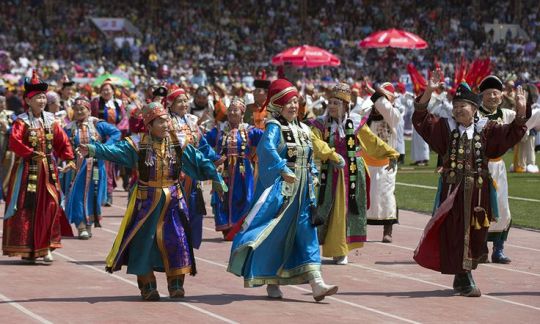
What is Naadam in Mongolian culture and how would Mr Mongolia celebrate it?
Naadam is a traditional sports festival in Mongolia. It includes Mongols adorning themselves in national dress, mounted soldiers in uniform, music, dancers, and of course, the "Three Manly Sports":
Horse riding, wrestling and archery!
Naadam is a 2000 year old event, however, the term "Naadam" was coined in the 13th century by Chinggis Khaan (according to the secret history of the Mongols) and has been celebrated ever since.
Naadam used to be a preparation/practices/training for war. Competitions such as this would take place just before major battles in order for the war commanders to select which soldiers would be in which division.
Individuals who demonstrated exceptional strength, speed, and flexibility in wrestling, keen eyesight and precise hand-orientation in spear-throwing and archery, and also patience and skill in horse training/horse racing were carefully selected during the competitions.
Naadam takes place around mid-July in the heat of the summer, and is considered one of the biggest and most important festivals in Mongol culture along with Tsaagan Sar.
National Naadam is celebrated in the capital - Ulaanbaatar, in the national sports stadium. However it's not just restricted to the city! It takes place all across the country.
The Naadam festival kicks off with a ceremonial transfer of the symbolic "Nine Banners of the Great Mongol Empire" from the Government House to the Naadam stadium, escorted by honorary guards.
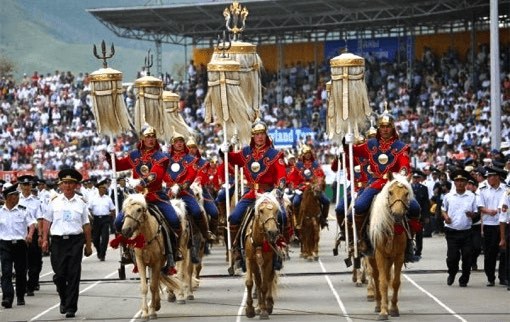
After a speech by the president or a representative, the games officially commence. In Ulaanbaatar, the capital, the event assumes a grand scale, drawing the most talented wrestlers, horse trainers, and archers from all corners of Mongolia!
As I've previously mentioned, Naadam takes place in the countryside too! In the countryside, herders journey to towns not only to partake in the festivities but also to reunite with friends and relatives, they may not have seen in a while.
Mongolia also has a bit of a reunion - with different Mongolic ethnic groups and other ethnic groups who's people participate in Naadam coming over to visit. Buryat and Uriankhai people are an example, and they (So, Buryat Mongols, Uriankhai/"forest people" as Mongols call them, usually denoting the likes such as Tuvans and Yakuts) have their own archery competitions. It's basically like one big get together!
Wrestling
Mongolian wrestling has no time limit and one objective - avoid touching the ground with anything other than your feet, or else you lose the match.
It also has no weight classes!
The National Wrestling Championship takes place during Naadam , however even before this, there are previous stages.
First is Soum (village) Naadam. Soum Naadam showcases wrestlers from various villages vying for the opportunity to represent their respective villages at the regional level.
Wrestlers who win at the Soum Naadam progress to the Aimag (province) Naadam, where they contend against other wrestlers within their own province to win the opportunity to represent the province.
The ultimate challenge awaits the winner of the Aimag Naadam at the National Naadam in Ulaanbaatar, the grandest and final tournament. Here, the aimag representatives vie for the prestigious title of national champion!


Mongol wrestling painting, 16th century
I definitely think Mr Mongolia is an avid wrestler/quite sporty himself (jock™) however he is a nation and so his nation strength and... Many, many years of experience would mean that it would be unfair for the most part if he went against humans. And besides, he absolutely risks outing himself if he participated in Naadam, especially with how popular wrestling is and uhh, considering the wrestling outfits... The lack of anonymity with that comes with it hahah.
However I think he participates in his own way. I think occasionally he helps with being with being a referee. Another thing: music. During Mongol national wrestling matches, you can often hear someone singing a Mongolian long song in the background. A long song is well, a song, which doesn't actually have a lot of words, but the the words are drawn out by the singer and emphasis is put on reaching impressive notes and putting power and volume in the voice. I think he does musical performances during naadam!
Archery
The Mongols are famous for their archery. There are many different types of Mongol archery.
There's Khalkha Archery, the most practiced one (seeing as the Khalkha Mongols are the majority ethnic group in Mongolia), spanning across a remarkable duration of 48 hours.
Those who triumph in this contest earn the esteemed distinction of the state archery title.
There's also women's archery! As for the women's archery tournament, they display their prowess by releasing 20 arrows towards a 60-meter target, while their male counterparts take aim with 40 arrows at a distance of 75 meters. The target itself comprises a symmetrical arrangement of diminutive leather cylinders, artfully positioned in rows of two and three.
Two red cylinders occupy the center of the target, but hitting them doesn't earn extra points. Each hit on a target gives one point, but merely hitting isn't enough for a score. The target must move a set distance from its starting point to count towards the final score.
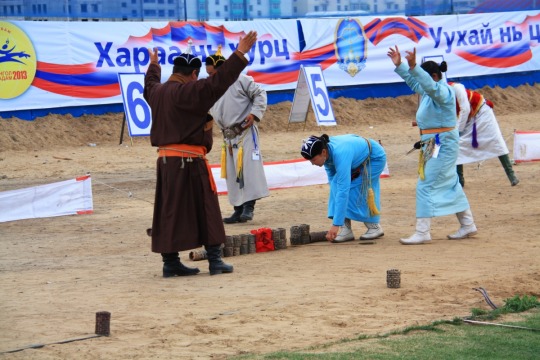
There's also Uriankhai archery and Buryat archery - with Uriankhai archery only being practiced by men, and is practiced by the Uriankhai ethnic groups (this is a name Mongols give to what they consider Northern "forest people" like Tuvans or Yakuts). It has ties to religious ceremonies related to their culture. Buryat archery is practiced by the Buryat minority ethnic group of Mongolia. Both of which take place during the national Naadam festival.

They even have child archers!
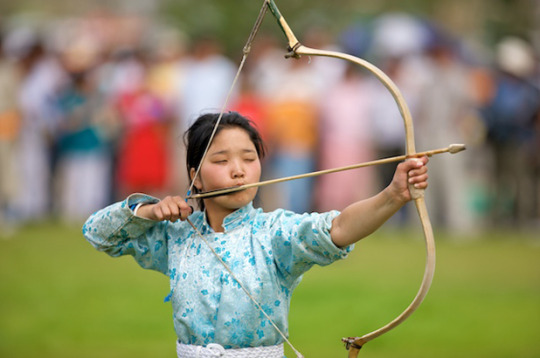
I definitely think Mongolia is very passionate about archery, and watches the archery competitions intently. I think he helps with setting up the targets and prepping some of the archers when he can. He finds it fascinating to watch them display their skills and techniques with such precision and accuracy - and he wishes he could participate himself! He believes it is a testament to the level of dedication and hard work that athletes put into their craft and loves the satisfaction of the perfect hit - he'll always appreciate a good archer. Further, he puts time aside to go and watch the Buryat and Uriankhai archery with Buryatia and the others as its quite important to them all.
Horse racing
Over a thousand horses gather from all corners of the region to partake in this grand event. Diverging from Western traditions, these races traverse immense distances, spanning a remarkable range of 15 to 30 kilometers. The length of each race is intricately tied to the age of the horses, with the seasoned contenders gallantly competing over the longest stretches.

Curiously, the jockeys who guide these horses are not seasoned professionals, but rather children as young as 5 years old, with the oldest among them being 13. Yet, it is the horse's prowess that truly determines the outcome, as the race serves as a testament to their remarkable skills.
Age and gender play crucial roles in the classification of horses within the realm of horse racing. For example, in the case of geldings, they are divided into distinct age groups, spanning from 2 years old up to 6 years and older.
The races commence in a distinctive manner. All the horses gather behind a standard-bearer, cross the finish line together, and then follow the guidance of the official rider to reach the starting line.
In each class, the top 5 performers are crowned as "airgiyn tav," and the top three champions proudly claim gold, silver, and bronze medals. People joyfully sing their praises while showering them with fermented mare's milk (airag) on their rump, neck, and cheek.
The victorious jockey ascends to the esteemed title of "tumny ekh," signifying their leadership over a multitude of ten thousand.
Multiple races are showcased during Naadam. Stallions, specifically those known as Azarga, have a race of their own, while geldings partake in a minimum of three races. Further, a special race is organised specifically for pacing horses in Ulaanbaatar.
Remarkably, even the horse that crosses the finish line last in the two-year-old category is bestowed with a special appellation: "bayan khodood," meaning "full stomach." A heartfelt song resonates through the air, expressing good wishes and luck for the humble competitor to emerge triumphant in the following year.
The subject of child-jockeys seem to be somewhat contested amongst Mongols themselves. I'm not going to touch on that debate, however it should be noted that safety measures have been implemented in order to make sure that the race is as smooth as possible, but I understand that this can be a point of controversy. I definitely think Mongolia does his best in making sure the riders are well prepared/equipped for the races to ensure that have the best chances of coming out uninjured/relatively unscathed as possible. I think he puts extra time and care into this aspect of his Naadam participations considerably. He enjoys it to an extent as it reminds him of when he was a very young horse rider, and he does enjoy the celebrations afterwards, however the safety of the riders is at the forefront of his mind.
Other Naadam headcanons:
-Because Mongols usually wear their best clothes to Naadam, Mongolia definitely does too! He has a different outfit planned for each day.

-He uhh definitely enjoys all the food that's about 🤤 (khuushur, buuz)

-Probably floods his social media with pictures during this time
-Overall, it's quite an exciting yet busy time for him, he is involved in both the preparations for Naadam and participation in some aspects of Naadam, whilst also making sure to keep socialising with all the people he's invited over! But he manages it well.
#hetalia#aph mongolia#hws mongolia#Hetalia Mongolia#hetalia world stars#hetalia world series#hetalia world twinkle#Meta hetalia#Historical hetalia#Aph Buryatia#Hws Buryatia#Hetalia Buryatia#Aph Asia#Hws Asia#Aph east Asia#Hws east Asia#Hetalia east Asia#hetalia headcanons#Hetalia oc#OC: Baatar Batbayar
69 notes
·
View notes
Note
How many languages does England know?
Far too many to define, many of them being that blurred area of dialect, pidgin, or creole between languages
He speaks an old form of Brythonic as his first language, then whichever particular ones the Celtic tribes of his land spoke. These languages and dialects are mostly forgotten or all mixed together- a word from one, a phrase from another, an expression from a third- but the earlier Brythonic language still comes to him in dreams sometimes, and the others as dreams of memories related to a particular region or person. The languages and dialects he shared with his brothers are clearer as he would have had practise after the languages themselves died out, but the ones he alone held all those years ago are almost long gone
Aside from these he knows Latin and Ancient Greek, which both once would have been essential. Norman French, obviously, and Norse too- all languages which have melded into English and left their mark. The same can be said for the old Celtic- Latin creole, and the old Anglo-French: remains of his people merging and taking in new waves of immigration.
Old English itself he would still be considered fluent in, if rusty, although some dialects are weaker and the Wessex dialect is strongest (more written text from this one survives compared to the others). This is the same for Middle English, and obviously Early Modern and Modern English he's an old hat
These older languages are becoming weaker the more time goes by and the less he uses them. He can't use or remember perfectly all of his languages, it's impossible to. And although I think nation memories are better than mortals, and overall they are FAR better at learning and remembering language in order to communicate with whoever they claim as their own, there is still only so much time he can dedicate to maintaining a language that no one else ever uses, or remembers. He does not need to keep these linguistic nuances, they are not essential to understand his people, and so they exist either for him and his memories alone, or a few other people. He and Francis are the last speakers of Norman French and Anglo-French. He and his brothers the last Brythonic speakers. He alone remembers the forgotten Cumbric language, or the spoken words of Boudica, and with no one but himself to talk to the language shrinks and grows stale. Still there, but barely. Coming in bursts, or leaving him lost for words
For modern languages, he knows his brothers' languages, athough not all of their branches and forms and he likely has a few centuries of knowledge missing from several of them. He knows modern Welsh, Cornish, Scottish Gaelic and Irish Gaelic, and understands Francis when he speaks Breton.
He's fluent in French, German, Hindi, Spanish, Mandarin Chinese, Japanese and Arabic and, as these are used the most in his life outside of English, he's probably now more comfortable in these than Latin or Ancient Greek which once would have held the same role for international communication.
He's also let many languages slide. He would have once been fluent in modern Greek, and Cantonese, although now he's not. Urdu would have once been great, and although he's good at Portuguese and understands it perfectly, he trips over himself sometimes and might mix it up more with Spanish than he used to. There are many many more too that i'm missing from this section- the man has travelled about and he'll have picked up a good many on his travels to use when he needs to and then forget when he doesn't
124 notes
·
View notes
Text
Xenofiction: Fiction focusing on non-humans with non-human perspectives and experiences.
A good rule of thumb is that if the characters can be replaced with super-powered humans, it's not Xenofiction. But it's obviously a tad more complicated than that.
35 notes
·
View notes
Text
The Anglospheres big 3 signs
England (based on coronation of William the Conqueror):
Capricorn sun
Pisces Moon
Aries rising
America (based on Declaration of Independence):
Cancer sun
Aquarius moon
Sagittarius rising
Canada (based on Dominion of Canada creation):
Cancer sun
Gemini moon
Aries rising
Australia (based on commonwealth of Australia creation) :
Capricorn sun
Taurus moon
Aries rising
New Zealand (based off of Treaty of Waitangi):
Aquarius sun
Aries moon
Taurus rising
Canada shares an Aries rising sign with England. Australia shares a Capricorn sun and Aries rising with England. New Zealand has one of Englands big 3 with the Aries moon. So it's official. America is the only nation within the Anglosphere who doesn't share a big 3 sign with England, but does have similarities with Canada (both have Cancer sun and Air moons) and New Zealand (America's Aquarius moon matches New Zealands Aquarius sun). You'll note, though, that Capricorn and Cancer are highly compatible sister signs, with Capricorn being the father of the zodiac and Cancer the mother! They sort of act as a balance to each other, similar to yin and yang, opposites attract etc. Irl, it's no wonder that the Capricorn-Cancer nations keep gravitating toward each other throughout history. Canadas near unshakable loyalty to the British crown aka England, AUKUS (alliance between America, a Cancer sign and two Capricorns Australia and an England led UK), Canadian-Australian relations in general, the Special Relationship alliance (and before that the Great Rapprochement) between America and Britian (ahem England), and Five Eyes as a whole. Cute. I also love how Australia and New Zealands moon and rising combos are just reversed versions of each other lol also cute
#hetalia astrology#hetalia#aph america#aph england#aph canada#aph australia#aph new zealand#aph anglosphere#hetalia meta
53 notes
·
View notes
Note
Do you have any gerame/ameger thoughts you’d like to share? 🎤🎤🎤
It’s a solid rizz ‘em with the ‘tism from both sides. They’re both nerds. Engineers but different flavors. Two archaeologists if you’re like me and so inclined. Special interests galore. You can distract two birds with one Wikipedia rabbit hole stone. Just give them the page for concrete and it’s going to be the most focused you see either of them. They will attempt to engineer their way out of many things, sometimes literally.
Ludwig is also the hood to the falcon that is Alfred; he has the steadfast nature to keep that dreamer from flying away, or merely too high. But falcons are strong, able to bear things much heavier than they into the air. Alfred has that easy personable confidence that can drag Ludwig out of the house and out of the shell. I’d like to think there’s some admiration on both sides. ��How does he make interaction look so easy?” vs. “How does that guy manage to stay so focused?” Despite Alfred being older, y’know, it’s Lud that’s got the itinerary for everything while the other tries to get him to be loose and wing it. They can balance each other. It helps that they’re both young yet still and contain a lot of energy.
Also autism be damned but both of my boys can GRILL. Maybe this is just me bringing my own Texas history and heritage into it, but we find that many barbecue techniques here stem from our history of German immigrants and settlement (though of course that’s not the only source). Lud and Al are also just peak dad fashion couple, I fear. Give them both a lawnmower and the white Reeboks, your grass will be cut in no time.
#callsign gremlin checking in#alfred f. jones // daring to fly#ludwig beilschmidt // meine stärken und meine schwächen#gerame // mach speed meta#hetalia#aph america#aph germany#hws america#hws germany#alfred f jones#ludwig beilschmidt#gerame#ameger
140 notes
·
View notes
Note
When it comes to personifications, what do you think are the factors that cause a nation to have a “modern” form derived from an “ancient” personification (i.e. Greece and Ancient Greece, Egypt and ancient Egypt)? I mean, I get that it may be an inconsistentency or creative choice done by Himaruya, but how is it possible for other older nations to manage to live for so long without producing a “modern heir” to replace them in the present day (i.e. China, Japan, Korea, India, Mongolia, etc.)?
interesting question! i definitely agree this is something inherently subjective. there isn’t really a singular way of interpreting the complexity of history, let alone how we’d transpose that history onto the helltalias and their lifespan. at least for me, i rationalise some of it in relation to historiography and dynamics of political-cultural contiguity, such as with how Himaruya takes opposing approaches for China and Rome (whom i will focus on in this ask).
for China (aka my great-grandpa): in terms of history, i want to first emphasise that all cultures change; it isn’t a perfectly continuous, unbroken 4,000 year old civilisation, even if we often like to trace Chinese history right back to the ostensible Xia dynasty. there are some elements that have endured for a very long time (like the writing system)—but there were also periods of political disruption very similar to the fall of Rome (and one can argue Rome endured in many ways). however, in terms of melding it to hetalia canon—Yao being old as balls fits quite nicely with the ‘dynastic cycle’ historiography of China—that Chinese history is an unbroken succession of dynasties. Which is flawed actually, but which has tended to dominate perceptions of Chinese history all the same. ergo—‘the empire long divided must unite’, or the thought of the first emperor ‘uniting China’ (as opposed to ‘conquering a vast empire stretching from the north all the way down South to Vietnam and other non-Han ‘Baiyue’ tribes, and Sinicising dozens of different nations that had some similarities with how conquered European and Middle Eastern/North African regions ‘became Roman’).
to me, Yao being extremely old also fits with the way Chinese cultural influence has dominated in the region in terms of influence on material culture, philosophy and language. Like, in the Confucian hierarchy, age = prestige. He sees himself as the great empire and well spring of civilisation (humble? nah, he’s rather arrogant). He’s older than Kiku and Yong-soo, and likes to assert he is older than Lien (Vietnam) which she contests lol. With Kiku especially, I see a very long-running mentor/protege dynamic between them that has at times turned into an ‘ambitious apprentice backstabs his master’ relationship even before the modern era (i.e Toyotomi Hideyoshi’s attempted invasion of Ming China). There are also certain cyclical elements in Chinese culture; like China was historically influenced by Buddhism that came via India and its concepts of reincarnation. So, he dies but he comes back all the same, no matter if it’s in a different form (kingdom to empire to republic). as i headcanon him, there’s a mix of calm (i will endure and wait for spring to come again) but also sometimes spitefulness lol (i’m not dead yet, fuckers).
for Rome: i do headcanon that the Italybros are his sons not grandsons. when it comes to the historiography and cultural perceptions of it, there’s a lot of thought about ‘the fall of the (western) roman empire’ and in terms of political continuity, yes it is fairly clear that the roman empire is no more. historiographically, there’s a sort of linearity to how people have perceived it too: a dramatic rise and fall, beginning and ends. you have people like Petrarch calling the medieval period the “dark ages”, in contrast to the “light” of Rome and the rest of classical antiquity. this is something that most medieval historians today won’t agree with (incl my old professor haha who was a specialist in women’s medieval history)—the parts of Europe (and MENA) that made up the old Roman Empire sure as hell didn’t stand still for a thousand years until the Renaissance; it was a period of cultural developments and not simply darkness and ignorance. but, in terms of transposing it to hetalia—i kind of think Roma being dead fits nicely with 1) the way people have perceived the history of Rome (rise and fall) 2) the medieval developments— all the new European states (and some older ones) emerging from the shattered remnants of the empire, all of them changed by Rome in some ways (Latin --> different Romance languages.) in contrast to China, i guess reincarnation is less of a concept in the Roman pantheon or in Christianity.
i think there’s also a sort of ironic poetry to it, when the fall of Rome is put in context of larger imperial and global history. Rome becomes this mythical figure who haunts the imagination of the European personifications precisely because he’s dead— the towering patriarch who is the model of a grand maritime empire that all of them that used to be Roman colonies/provinces strive for in the 15th century onwards. Like, the Spanish empire had a motto of “further beyond” (plus ultra). In the Aeneid, Jupiter is said to grant the Romans “empire without limit” (imperium sine fine). Even England, where there was this duelling narrative of lionising Boudica (the Iceni queen who fought the Roman conquerors and burned Roman London the ground) and longing to be as great as Rome (there’s a caption on a Victorian-era statue of Boudica in London saying “regions Caesar never knew / thy posterity shall sway”. “Britannia” itself as a name for the UK is ofc from Roman rule. so when it comes down to it, i guess it really is a creative choice by Himaruya (and ourselves). and for me, it’s not just about Rome and China (or any other nation’s) own history but also thinking about historiography (i.e how that history is understood, in terms of dynastic cycles or rise and fall) + relationship with other characters.
#hetalia#hetalia headcanons#hws china#hws rome#aph china#aph rome#hetalia meta#also i am a romechu shipper lol and i guess i am here for the#vibes of Yao remembering a world long gone
107 notes
·
View notes